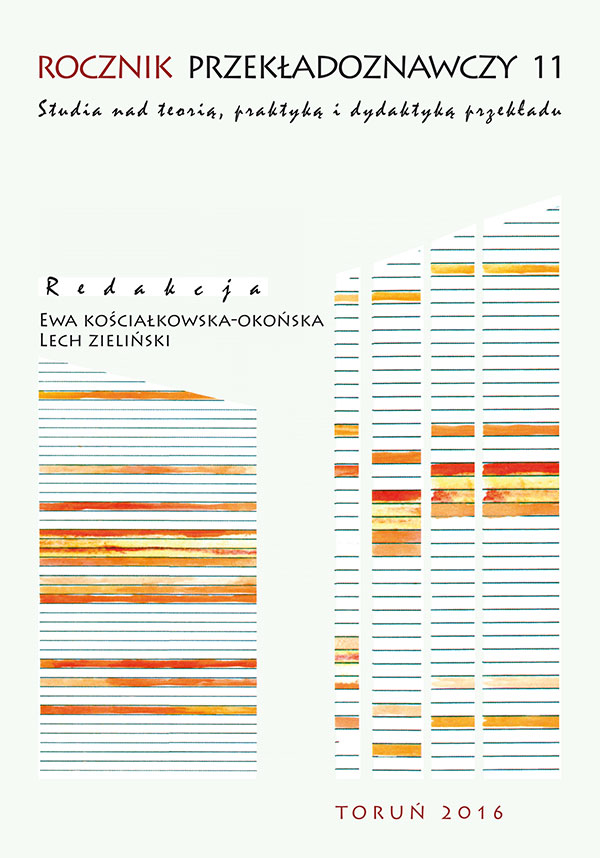Badania genologiczne w kontekście przekładu specjalistycznego
DOI:
https://doi.org/10.12775/RP.2016.003Słowa kluczowe
gatunek w przekładzie, genologia językoznawcza, przekład specjalistyczny, przekład prawniczyAbstrakt
Artykuł przedstawia w zarysie szybko rozwijający się nurt badawczy w przekładoznawstwie, którym jest prowadzona z perspektywy genologii refleksja nad rozmaitymi aspektami produktu i procesu w tłumaczeniu tekstów specjalistycznych. Dzięki wprowadzeniu do przekładoznawstwa pojęć i metod wypracowanych przez genologię lingwistyczną możliwe jest pogłębienie kontrastywno-porównawczej wiedzy z zakresu obecnych w danym dyskursie gatunków, która pozwala na świadome odtwarzanie logiki tekstu w przekładzie. Szczególnie owocne wydaje się połączenie przedstawianych w artykule metodologii analizy genologicznej i metod oferowanych przez językoznawstwo korpusowe.
Bibliografia
Ángeles Orts, M., 2012, „A genre-based approach to the translation of private normative texts in legal English and legal Spanish”, [w:] International Journal for the Semiotics of Law 25:3, s. 317–338.
Bachtin, M., 1986, „Problem gatunków mowy”, [w:] idem, Estetyka twórczości słownej, Warszawa, s. 348–402.
Baker, M., 1992, In Other Words, London.
Bazerman, C., 1994, „System of genres and the enactment of social intentions”, [w:] Genre and the New Rhetoric, A. Freedman, P. Medway (red.), London, s. 79–101.
Bhatia, V.K., 1993/2003, Analysing Genre. Language Use in Professional Settings, Harlow.
Bhatia, V.K., 1997, „Translating legal genres”, [w:] Text Typology and Translation, A. Trosborg (red.), Amsterdam, s. 203–214.
Bhatia, V.K., 2004, Worlds of Written Discourse: A Genre-Based View, London.
Biber, D., 1988, Variation Across Speech and Writing, Cambridge.
Biber, D., Conrad, S., 2009, Register, Genre, and Style, Cambridge.
Biber, D. i in., 2007, Discourse on the Move: Using Corpus Analysis to Describe Discourse Structure, Amsterdam.
Borja Albi, A., 2007, „Corpora for translators in Spain. The CDJ-GITRAD Corpus and the GENTT Project”, [w:] Incorporating Corpora – The Linguist and the Translator, G. Anderman, M. Rogers (red.), Clevendon, s. 243–265.
Borja Albi, A. i in., 2009, „Research methodology in specialized genres for translation purposes”, [w:] The Interpreter and Translator Trainer 3(1), s. 57–77.
Cap, P., Okulska, U., 2013, „Analyzing genres in political communication: An introduction”, [w:] Analyzing Genres in Political Communication, P. Cap, U. Okulska (red.), Amsterdam, s. 1–26.
Corbett, J., 2009, „Genre and genre analysis”, [w:] Concise Encyclopedia of Pragmatics, J.L. Mey (red.), Oxford, s. 286–292.
De Beaugrande R.-A., Dressler W.U., 1990, Wstęp do lingwistyki tekstu, tł. A. Szwedek, Warszawa.
Duszak, A., 1998, Tekst, dyskurs, komunikacja międzykulturowa, Warszawa.
Furdal, A., 1982/2008, „Genologia lingwistyczna”, [w:] Polska genologia lingwistyczna, D. Ostaszewska, R. Cudak (red.), Warszawa, s. 112–121.
Gajda, S., 1982, Podstawy badań stylistycznych nad językiem naukowym, Warszawa.
García Izquierdo, I., Borja Albi A., 2008, „A multidisciplinary approach to specialized writing and translation using a genre based multilingual corpus of specialized texts”, [w:] LSP & Professional Communication 8: 1, s. 1–18.
GENTT. Textual Genres for Translation, http://www.gentt.uji.es/ (dostęp: 3 listopada 2013).
Gruber, H., 2013, „Genres in political discourse. The case of the ‘inaugural speech’ of Austrian chancellors”, [w:] Analyzing Genres in Political Communication, P. Cap, U. Okulska (red.), Amsterdam, s. 29–71.
Hatim, B., Mason, I., 1990, Discourse and the Translator, London.
Hervey, S., Higgins, I., 2002, Thinking French Translation, wyd. 2, London.
Loewe, I., 2008, „Polska genologia lingwistyczna. Rekonesans”, [w:] Tekst i dyskurs – text und diskurs, nr 1, s. 23–36.
Maciejewski, M., 2009, Gatunki hipertekstu w perspektywie tekstologicznej. Analiza na przykładzie internetowych prezentacji przedsiębiorstw, Poznań.
Malinowska, E., 2009, „Polszczyzna urzędowa i jej warianty”, [w:] Stylistyka XVIII, s. 55–64.
Neubert, A., Shreve, G., 1992, Translation as Text, Kent.
Ostaszewska, D., 2008, „Genologia lingwistyczna jako subdyscyplina współczesnego językoznawstwa”, [w:] Polska genologia lingwistyczna, D. Ostaszewska, R. Cudak (red.), Warszawa, s. 11–39.
Rasmussen, K., Engberg, J., 1999, „Genre analysis of legal discourse”, [w:] Hermes 22, s. 113–132.
Skwarczyńska, S., 1932, „Próba teorji rozmowy”, [w:] Pamiętnik Literacki, t. 29, nr 1/4, s. 1–51.
Skwarczyńska, S., 1937, Teoria listu, Lwów.
Skwarczyńska, S., 1987, „Nie dostrzeżony problem podstawowy genologii”, [w:] Problemy teorii literatury, seria 2: Prace z lat 1965–1974, wyboru prac dokonał H. Markiewicz, Wrocław, s. 97–114.
Skwarczyńska, S., 2004 (1965), „Cechy konstytutywne gatunku”, [w:] Współczesna polszczyzna. Wybór opracowań, t. 3: Akty i gatunki mowy, J. Bartmiński, S. Niebrzegowska-Bartmińska, J. Szadura (red.), Lublin, s. 64–80.
Swales, J., 1990, Genre Analysis, Cambridge.
Trosborg, A., 1997, „Text typology: register, genre and text type”, [w:] Text Typology and Translation, A. Trosborg (red.), Amsterdam, s. 3–23.
Wierzbicka, A., 1983, „Genry mowy”, [w:] Tekst i zdanie, T. Dobrzyńska, E. Janus (red.), Wrocław, s. 125–137.
Witosz, B., 1997, Opis w prozie narracyjnej na tle innych odmian deskrypcji: zagadnienia struktury tekstu, Katowice.
Witosz, B., 2005, Genologia lingwistyczna. Zarys problematyki, Katowice.
Wojtak, M., 2004, Gatunki prasowe, Lublin.
Wojtak, M., 2011, „O relacjach dyskursu, stylu, gatunku i tekstu”, [w:] Tekst i dyskurs – text und diskurs, nr 4, s. 69–78.
Pobrania
Opublikowane
Numer
Dział
Licencja
Prawa autorskie (c) 2016 Rocznik Przekładoznawczy

Utwór dostępny jest na licencji Creative Commons Uznanie autorstwa – Bez utworów zależnych 4.0 Międzynarodowe.
Statystyki
Liczba wyświetleń i pobrań: 657
Liczba cytowań: 0



